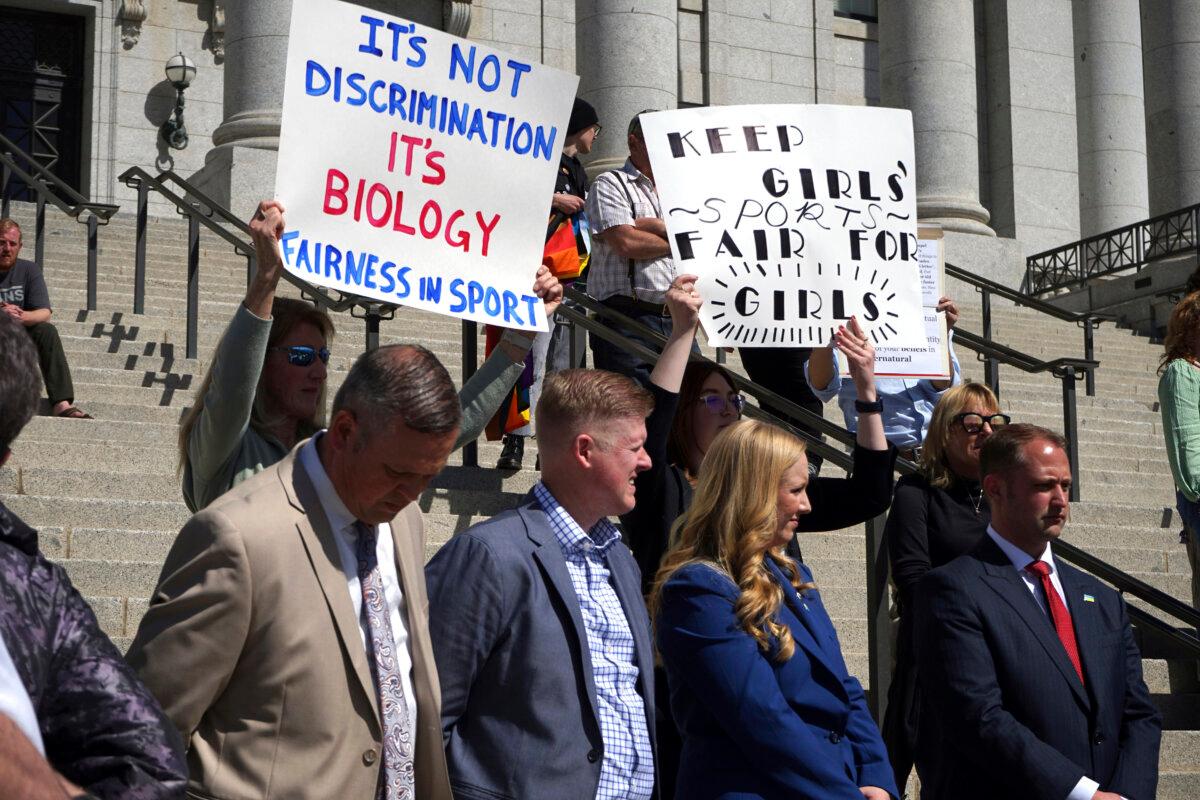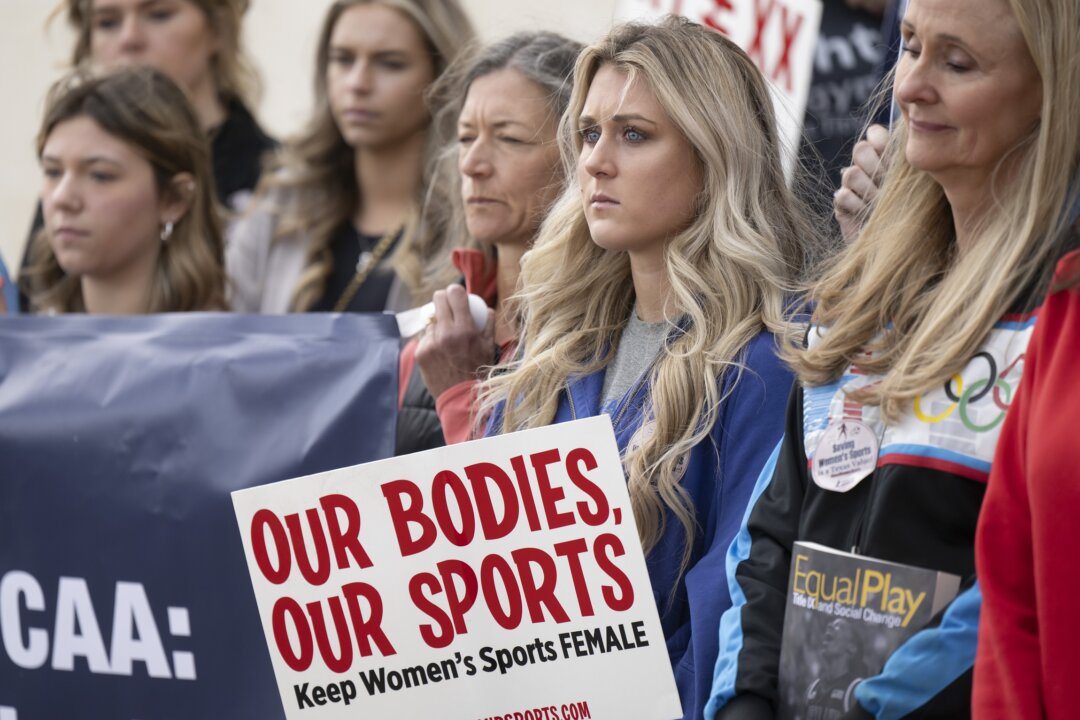The candidates’ views differ on men in women’s sports, as well as whether children should be able to undergo gender-related medical and surgical procedures.
The two major candidates vying to become America’s 47th president differ on many policies—but transgenderism represents one of the deepest divides between former President Donald Trump and Vice President Kamala Harris.
People who identify as transgender make up about 1.6 percent of the U.S. population, the Pew Research Center found in 2022.
Yet issues surrounding transgenderism have evoked robust responses among the wider population.
People have been debating whether men who identify as women should participate in women’s sports or use women’s locker rooms and bathrooms.
And, across the country, parents have objected to school systems fostering—and concealing—their children’s wishes to “switch” genders.
As voter attention is focused largely on the economy and border security, transgender-related issues remain a simmering concern for some as the presidential campaign rapidly heads toward the Nov. 5 election.
These matters are part of a deep cultural divide along political and ideological lines, suggests a Pew study in August of Trump and Harris supporters’ views.
One of the most polarizing issues revealed in the study: About 92 percent of Trump supporters said they believe that a person’s sex is determined at birth; among Harris supporters that number is 39 percent.
About 58 percent of Pew respondents said they strongly favor sex-based segregation in athletics based on participants’ biology, rather than declared identity.
Harris’s Views
As the Democratic presidential nominee, Harris has downplayed transgender issues even though she previously described herself as a staunch advocate for people who identify as transgender.
On Oct. 16, when Fox News’ Bret Baier questioned Harris on the topic of transgenderism, she replied, “I will follow the law.”
She gave a similar response to NBC on Oct. 22.
By contrast, in 2019, during her first presidential run, she said in an interview with the National Center for Transgender Equality Action Fund that providing gender-related surgery is “at its core, it’s a civil rights issue. It’s a justice issue. And it’s an issue of humanity.”
Harris also said: “Transition treatment is a medical necessity, and I will direct all federal agencies responsible for providing essential medical care to deliver transition treatment.”
She also said in 2019 that she is in favor of using taxpayer money to cover the costs of gender-altering procedures for incarcerated illegal immigrants. She made that statement in a candidate questionnaire from the ACLU, and first reported by CNN in September.

The questionnaire asked whether the candidate would use presidential authority to provide “gender transition” treatment for people, “including those in prison and immigration detention.”
Harris checked a box with “yes.” Then she wrote, in part: “I support policies ensuring that federal prisoners and detainees are able to obtain medically necessary care for gender transition, including surgical care, while incarcerated or detained.”
She said she would direct all relevant federal agencies “to deliver transition treatment.”
In the 2019 interview with the National Center for Transgender Equality Action Fund, Harris said she used the power of her former office as California attorney general to advance “the agenda” of the “movement.” She served in that role for six years, beginning in 2011.
Harris also said that she intervened in “a specific case” after learning that state prison officials “were standing in the way of [gender-altering] surgery” for prisoners.
Harris said she “worked behind the scenes” to help that person “get the services she was deserving.”
Inmate Shiloh Heavenly Quine, a male formerly known as Rodney James Quine who began identifying as female, was a convicted killer serving a life sentence.
Doctors deemed sex-reassignment surgery for Quine was “medically necessary,” but California prison officials balked.
In 2015, Quine settled a federal lawsuit against California, paving the way to undergo “sex-reassignment surgery,” a federal court record shows. The surgery was completed in 2017.
After that court fight, Harris worked to ensure the state changed its policy “so that every transgender inmate in the prison system would have access to the medical care that they desired and need,” she said in a 2019 interview.
Harris called that new policy “historic,” saying she thought it may be the first of its kind in the United States.
The Epoch Times sought comment from the Harris campaign but received no response prior to publication.
Trump’s Views
Trump has repeatedly vowed to “keep men out of women’s sports”—a line that invariably draws loud applause and cheers at his rallies.
Trump has repeatedly stated that he is against “transgender insanity” being taught to children in schools. Trump also denounces schools and therapists secretly “transitioning” children without parental consent.
Notably, in 2023, Trump denounced the procedures as “child mutilation” as he locked horns with Ohio Gov. Mike DeWine, a fellow Republican, over the latter’s veto of a state law banning transgender surgeries for minors and cross-sex sports competitions.
Lawmakers later overrode the veto and the ban remains in effect after surviving court challenges.
Trump wants a federal law passed to prohibit “child sexual mutilation” in all 50 states.
He opposes the Biden-Harris administration’s “gender affirming care” for minors, and calls for any health care provider involved in transitioning children to be terminated from Medicare and Medicaid.
He also wants to strip federal funding from school districts that suggest children can be “trapped in the wrong body.”

Title IX Battle
The Biden–Harris administration has implemented pro-transgender policies across multiple federal agencies since taking office in 2021.
The administration has worked to change Title IX to expand sex discrimination protection to students who identify as the opposite sex in schools, which would, among other things, allow males to play female sports and use female restrooms and locker rooms.
Title IX is part of the Education Amendments of 1972. The legislation prohibits sex-based discrimination in any school or any other education program that receives funding from the federal government. Its early advocates meant for it to protect women from discrimination in education based on sex and provide them with equal opportunities.
In April, the Department of Education finalized a rule redefining the meaning of “sex” within that legislation to include “gender identity.” That meant that men who identify as women must be given the same opportunities as women. Schools and colleges that fail to comply with Title IX stand to lose federal dollars.
Multiple states sued.
In June, a federal judge temporarily blocked the change to Title IX in six states: Kentucky, Indiana, Ohio, Tennessee, Virginia, and West Virginia. A Texas judge blocked the new rule’s enforcement in the Lone Star State. A judge in Louisiana halted its enforcement in Louisiana, Mississippi, Montana, and Idaho.
State Laws
In a significant development earlier this month, the U.S. Supreme Court agreed to consider whether to uphold a Tennessee law that bans gender-related medical and surgical procedures for minors.
Activists advocating for people who identify as transgender strongly oppose the law. But attorneys general from at least 22 of the nation’s 50 states support it.
Arkansas state Sen. Robin Lundstrum, a Republican who crafted the nation’s first such law, said she perceives a big difference between Harris and Trump on these types of restrictions.
“Children do not have the capacity to consent to the long-term devastating health consequences of surgical and chemical castration,” Lundstrum told The Epoch Times.
“Trump will help stop the attack on children and the emotional blackmail of their terrified parents.”
Lundstrum said Harris’s past actions indicate blanket support for transgenderism.
After a series of legal battles, Lundstrum’s 2021 Arkansas law remains “stalled” at a federal appeals court, she said. Its fate hinges on the Supreme Court’s ruling on the Tennessee case.

Almost half the states have passed laws restricting transgender medical and surgical procedures for minors, according to the Movement Advancement Project (MAP) a nonprofit transgender advocacy group.
Those laws are now being enforced in states such as Texas.
Texas Attorney General Ken Paxton recently announced legal action against two doctors allegedly involved in prescribing hormones for minors.
Paxton accused an El Paso pediatric endocrinologist of prescribing puberty blockers and hormones for more than 20 minors to treat gender dysphoria. In some cases, the patients were as young as 12, according to Paxton’s office.
Paxton filed a similar lawsuit against a Dallas-based doctor earlier this month, alleging the doctor falsified records to hide the fact she was prescribing hormones for gender dysphoria. Paxton claimed the doctor treated nearly two dozen minors.
The state is seeking fines against both doctors who stand to lose their medical licenses under the law if found guilty of violating the law.
Texas passed Senate Bill 14 in 2023, prohibiting medical providers from performing surgeries that sterilize children, such as removing parts of their reproductive systems, mastectomies, and prescribing drugs that induce temporary or permanent infertility, such as puberty blockers and cross-sex hormones.
Fifteen blue states and the District of Columbia have gone in the other direction and passed “transgender shield laws,” which shield minors seeking to transition and doctors who help them, according to MAP.
These laws protect transgender-identifying individuals or doctors from civil or criminal charges stemming from the state where medical procedures to transition are banned.
States such as California, Colorado, and Maine have passed extensive transgender protection legislation.
California became the first state in the country to ban school districts from requiring staff to notify parents of their child’s gender identification change under a law signed in July by Gov. Gavin Newsom.
Colorado passed two transgender-related laws in the spring: House Bill 24-1071 makes it easier for transgender-identifying felony convicts to change their legal name, and House Bill 24-1039 mandates that school districts use a student’s preferred name.
Besides passing a transgender shield law, Maine passed a law to update all printed forms that require a person’s gender to add an option to designate “X” for gender by Dec. 31, 2024.
The state made it legal in 2023 for 16- and 17- year olds to access gender-related hormones without parental consent in some situations.
Since 2018, Maine residents have been able to change their gender marker on their driver’s licenses.

